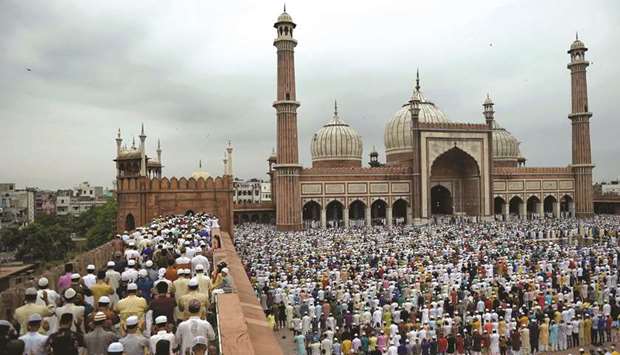Security forces yesterday kept Srinagar largely locked down for the festival of Eid al-Adha to prevent any major protests against a decision that scrapped the region’s special rights.
“There have been some isolated incidents of stone-pelting,” the Home Ministry said in a statement, but added they were of an “insignificant level”.
It said police dispersed the protesters and only one or two individuals suffered major injuries. It provided no further detail.
The authorities say there have been no bullets fired by security forces.
Reuters reporters were among the many people stopped at roadblocks and kept from entering parts of the city.
“In Srinagar, keeping in view the possibility of terrorists, militants and mischievous elements trying to disturb public order and peace, reasonable restrictions were imposed on large gatherings in sensitive areas,” the Home Ministry said.
People still gathered in mosques in large numbers in Kashmir yesterday, it added.
However, in Srinagar, several major mosques and religious sites, including the famous Jamia Masjid mosque with a capacity of more than 30,000, were closed, and worshippers were encouraged to attend prayers in smaller mosques near where they lived.
“There are some mosques which are not open, that is because it is the view of the administration that is a sensitive law and order situation,” said an Indian government source in New Delhi.
The clampdown on communications remained in place for an eighth day, with no regular Internet, mobile phone or fixed-line links working.
Residents said the rapt silence on the city’s streets was like nothing they had ever experienced before on the Eid festival.
Even best-known areas, such as the city square, Lal Chowk, that would otherwise be crowded with people were empty.
Several paramilitary and police officials referred to the restrictions as a “curfew” in conversations with Reuters reporters.
The official stance is that there are restrictions, but no curfew.
The restrictions in Srinagar were the city’s tightest ever, two paramilitary officials told Reuters yesterday.
Police and troops, many wearing heavy riot gear, dotted silent streets where checkpoints had been added around midnight, with more concertina wire laid out to create barricades.
The decision to tighten restrictions followed a meeting of the state’s chief secretary with district administrative and police officials on Sunday, a senior government official told Reuters.
“It was decided that the restrictions would be imposed on Eid to prevent gatherings that could turn violent.”
“There have been some minor localised protests of a routine nature in a few places,” the Home Ministry statement said. “This is not unknown in Jammu and Kashmir in the past.”
Leaders in Kashmir had warned of a backlash against stripping autonomy from the territory.
Yesterday, there were few signs of festivities, with many Srinagar residents saying they planned to skip the usual ritual of animal slaughter as they did not feel like celebrating.
“What are we celebrating? I can’t call my relatives to wish them Eid, we can’t go out to buy things. So, what kind of celebration is this?” asked Aneesa Shafi, an elderly woman entering a mosque in Srinagar’s Barzulla area.

Devotees offer prayers during Eid al-Adha at Jama Masjid in New Delhi yesterday.
